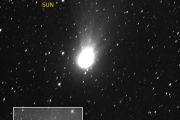
Copernical Team
Sounding the alarm: ESA introduces space environment ‘health index’

The congestion and pollution of Earth orbit is quickly getting worse. We need to be able to quantify how our behaviour impacts the orbital environment in the future. To this end, the European Space Agency (ESA) is adding a new health index to its yearly Space Environment Report that summarises in one number the status of our space environment over time.
Muon Space to Equip Halo Satellites with Starlink Mini Laser Links for Real-Time Global Connectivity
 Muon Space has announced a landmark agreement with SpaceX's Starlink to integrate the company's mini laser terminals into Muon's high-performance Halo satellite platform, marking a major leap toward real-time, high-speed global connectivity in orbit.
Starlink's mini laser terminals are capable of achieving optical link speeds up to 25 Gbps across distances of 4,000 km and even higher at sh
Muon Space has announced a landmark agreement with SpaceX's Starlink to integrate the company's mini laser terminals into Muon's high-performance Halo satellite platform, marking a major leap toward real-time, high-speed global connectivity in orbit.
Starlink's mini laser terminals are capable of achieving optical link speeds up to 25 Gbps across distances of 4,000 km and even higher at sh ESA-backed project paves way for next-generation in-flight connectivity
 A new antenna system supported by the European Space Agency (ESA) could soon make high-speed streaming and real-time video calls available to airline passengers worldwide. Following the success of an ESA-backed test campaign, global satellite communications leader Viasat plans to commercialize its new in-flight connectivity solution, Viasat Amara.
The Amara system features a dual-beam phas
A new antenna system supported by the European Space Agency (ESA) could soon make high-speed streaming and real-time video calls available to airline passengers worldwide. Following the success of an ESA-backed test campaign, global satellite communications leader Viasat plans to commercialize its new in-flight connectivity solution, Viasat Amara.
The Amara system features a dual-beam phas 4MOST marks first light at ESO's Paranal Observatory
 The 4-metre Multi-Object Spectroscopic Telescope (4MOST) has achieved its first light at the European Southern Observatory's Paranal site in Chile, marking a major milestone for one of the world's most ambitious astronomical survey instruments. Mounted on the VISTA telescope, 4MOST will soon begin its full scientific operations, opening new frontiers in understanding the origins of stars, galaxi
The 4-metre Multi-Object Spectroscopic Telescope (4MOST) has achieved its first light at the European Southern Observatory's Paranal site in Chile, marking a major milestone for one of the world's most ambitious astronomical survey instruments. Mounted on the VISTA telescope, 4MOST will soon begin its full scientific operations, opening new frontiers in understanding the origins of stars, galaxi 'Messy' galaxies in the early universe struggled to settle
 Astronomers using the James Webb Space Telescope (JWST) have captured the most detailed look yet at how galaxies formed just a few hundred million years after the Big Bang - and found they were far more chaotic and messy than those we see today.
The team, led by researchers at the University of Cambridge, analysed more than 250 young galaxies that existed when the universe was between 800
Astronomers using the James Webb Space Telescope (JWST) have captured the most detailed look yet at how galaxies formed just a few hundred million years after the Big Bang - and found they were far more chaotic and messy than those we see today.
The team, led by researchers at the University of Cambridge, analysed more than 250 young galaxies that existed when the universe was between 800 Rocket Lab sets November launch for next iQPS Earth-imaging satellite
 Rocket Lab has confirmed the launch window for its next Electron mission, marking the sixth flight for its long-standing customer, the Institute for Q-shu Pioneers of Space (iQPS) of Japan. The dedicated mission, titled "The Nation God Navigates," is set to lift off from Launch Complex 1 in New Zealand during a window opening on November 5, 2025 UTC.
The launch will deploy the QPS-SAR-14 s
Rocket Lab has confirmed the launch window for its next Electron mission, marking the sixth flight for its long-standing customer, the Institute for Q-shu Pioneers of Space (iQPS) of Japan. The dedicated mission, titled "The Nation God Navigates," is set to lift off from Launch Complex 1 in New Zealand during a window opening on November 5, 2025 UTC.
The launch will deploy the QPS-SAR-14 s China charts new path for integrated space and terrestrial connectivity
 China is accelerating its push to establish a globally competitive satellite communication network, with new national guidelines outlining a roadmap for large-scale deployment and integration with next-generation terrestrial systems.
Backed by the Ministry of Industry and Information Technology (MIIT), the initiative aims to position satellite communications as a key pillar of China's digi
China is accelerating its push to establish a globally competitive satellite communication network, with new national guidelines outlining a roadmap for large-scale deployment and integration with next-generation terrestrial systems.
Backed by the Ministry of Industry and Information Technology (MIIT), the initiative aims to position satellite communications as a key pillar of China's digi China deploys Pakistan's first hyperspectral satellite with Kinetica 1 rocket
 CAS Space successfully launched the ninth rocket in its Kinetica 1 series on Sunday, placing three satellites - including Pakistan's first hyperspectral imaging satellite - into orbit from the Jiuquan Satellite Launch Center in northwestern China's Gobi Desert.
The launch took place at 11:33 a.m. local time on October 19. According to the company, the rocket deployed two synthetic aperture
CAS Space successfully launched the ninth rocket in its Kinetica 1 series on Sunday, placing three satellites - including Pakistan's first hyperspectral imaging satellite - into orbit from the Jiuquan Satellite Launch Center in northwestern China's Gobi Desert.
The launch took place at 11:33 a.m. local time on October 19. According to the company, the rocket deployed two synthetic aperture Iridium and T-Mobile expand PNT deployment under U.S. DOT resilience program
 Iridium Communications Inc. (NASDAQ: IRDM) has been awarded a new contract by the U.S. Department of Transportation (DOT) under its Complementary Positioning, Navigation, and Timing (CPNT) Action Plan Rapid Phase Award II. The agreement supports a large-scale rollout of Iridium's PNT technology to enhance the resilience of critical U.S. infrastructure, particularly 5G wireless networks.
Wo
Iridium Communications Inc. (NASDAQ: IRDM) has been awarded a new contract by the U.S. Department of Transportation (DOT) under its Complementary Positioning, Navigation, and Timing (CPNT) Action Plan Rapid Phase Award II. The agreement supports a large-scale rollout of Iridium's PNT technology to enhance the resilience of critical U.S. infrastructure, particularly 5G wireless networks.
Wo Solar geoengineering faces daunting practical and political challenges
 Efforts to cool the planet by reflecting sunlight back into space may be far more difficult than previously imagined, according to new research from Columbia University scientists. Their analysis highlights the immense scientific, logistical, and geopolitical hurdles involved in stratospheric aerosol injection (SAI) - a proposed form of solar geoengineering that seeks to counter global warming b
Efforts to cool the planet by reflecting sunlight back into space may be far more difficult than previously imagined, according to new research from Columbia University scientists. Their analysis highlights the immense scientific, logistical, and geopolitical hurdles involved in stratospheric aerosol injection (SAI) - a proposed form of solar geoengineering that seeks to counter global warming b 





























